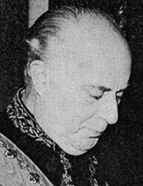

Eduardo Brazão was born in Lisbon on 1 February 1907, the son of Eduardo Joaquim Brazão (1851-1925) and Maria José da Silva Reis Brazão. His father, whose Memoirs he compiled and published (1925), enjoyed significant social prestige: he was first married to the famous actress Rosa Damasceno (1849-1904) and was considered the greatest actor of his time. Eduardo’s childhood home was frequented by the best known playwrights and artists of the time. In an attempt to keep him out of the theatre world, his mother sent him to study at the Colégio de La Guardia, where the Jesuits had fled after being expelled once again from Portugal following the establishment of the Republic. He returned to Lisbon to take the exam for the seventh (and final) year of grammar school and, on the advice of Lino Neto, ultimately chose to go to law school. In his first year, he was fascinated by the lessons given by Paulo Merêa. He considered himself Merêa’s disciple, feeling increasingly drawn to history. Fearing that the distractions of Lisbon would divert his attention from his studies, his mother sent him during his second year to the University of Coimbra, where he lived in a student house for young Catholic men. In Lisbon, he frequented the bohemian literary scene, wrote for newspapers and composed a book of poems – Maria do Mar (1928) – with illustrations by Arlindo Vicente. He lived together with intellectuals and artists of various political leanings, from João Ameal and Alfredo Pimenta to Almada Negreiros and Álvaro Cunhal. A monarchist, he was an enthusiastic supporter of Integralismo Lusitano (Lusitanian Integralism), a follower of Maurras, an admirer of Sardinha’s nationalist propaganda, and he was thrilled by Sidónio and enthusiastic about D. Duarte (Memorial...,1976, pg. 178 and 308, 309).
After completing his studies, he married, had three children and opened a law office on Rua Nova da Trindade in Lisbon. While preparing for the competitive entrance exam at the Ministry of Foreign Affairs, which took eight years to open, he wrote dissertations on the subjects specified in the programme. He took an avid interest in his work, publishing História Diplomática de Portugal (Diplomatic History of Portugal) (1932, 1933), which consisted merely of the first two volumes of his notes. He later acknowledged mistakes in what was his first work of a historical nature, which had met with sharp criticism from Alfredo Pimenta. The remaining notes were released in magazine and newspaper articles: Portugal no Congresso de Utrecht (Portugal in the Congress of Utrecht, 1934), A questão colonial portuguesa na segunda metade do século XIX (The Portuguese Colonial Question in the Second Half of the 19th Century, 1935), O Conde de Tarouca em Londres (The Count of Tarouca in London, 1936), D. João V e a Santa Sé (King João V and the Holy See, 1937), Recepção de uma Rainha (Reception of a Queen, 1937), O Casamento de D. João V (The Marriage of King João V, 1937). He concluded by editing a summary entitled Relance da História Diplomática de Portugal (A Glance at Portugal's Diplomatic History, 1940).
